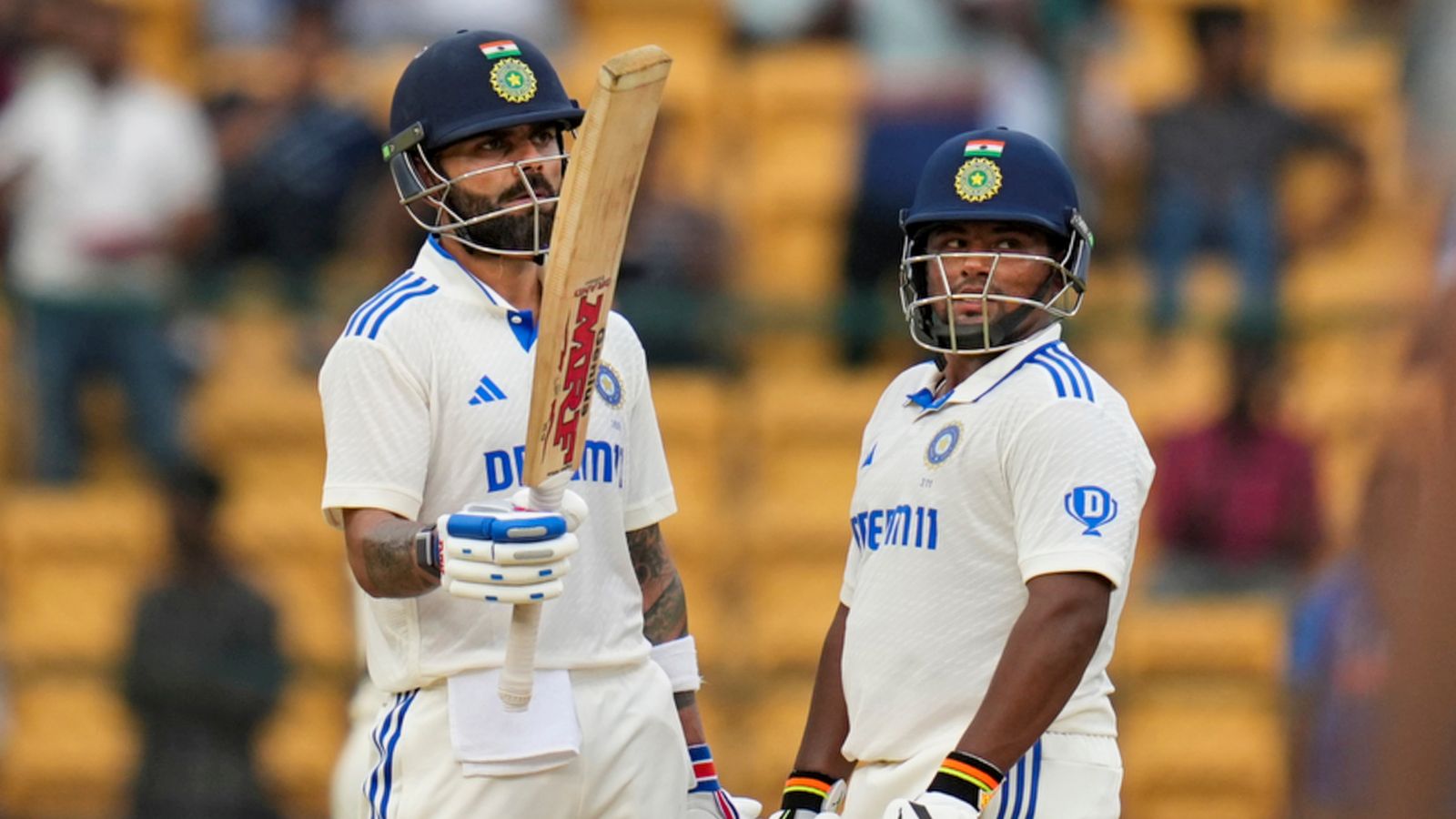The day ended fittingly with one last twist. The light was fading, the spectators were hitting the exit door, the groundsmen were waiting on the edge of the boundary rope with their brooms, when Virat Kohli nicked behind off Glenn Phillips. He sought a futile review, and as he staggered to the dressing room, the umpires called it a day. India had purred to 231 for three, a stoic resurrection though not yet a complete redemption, as they still trail New Zealand by 125 runs.
The Kohli departure maintained the delicate balance of the game. Had he remained unbeaten at stumps, India would have been content with their fightback, while New Zealand would have regretted letting the hosts claw back into the game, fully aware of the menace of India’s spinners in the fourth innings.
As it stands, both teams would feel bittersweet at how the day unfolded. The audience, though, would feel the cold sweat of suspense crawling up their bodies.
The turns in the game came in unexpected bursts. Until the final act of the day, nothing had hassled Kohli or Sarfaraz Khan. The surface shed its fangs, and was now smiling runs at batsmen. All four Indian batsmen on show struck while the iron was hot, before the surface began to crumble and the spinners began to unpack their mischief. Rohit Sharma and Yashasvi Jaiswal spared no loose ball, while blunting the new ball.
As New Zealand’s seamers struggled to locate their lengths or coerce any movement off the surface, they began to err. Rather than full balls deviating viciously, batsmen got boundary-scoring opportunities. Sharma crunched Matt Henry, the first innings hangman, for a brace of fours, before slapping Tim Southee through point. Jaiswal then took on William O‘Rourke, caning him for a couple of fours.
A momentum swing could be sensed. Panicked, even though they had a big cushion, New Zealand commissioned the spinners, only for the rampaging Indian pair to relish. In a twinkle, India were 70 for no loss in 17 overs. But Ajaz Patel, the 10-wicket Sultan of Wankhede, took them out to stall India. Tom Latham and Co discovered a fresh wave of energy. Little did they know that they would be without respite for the next couple of hours.

The left-arm spinner floated the ball and tried to bait Sarfaraz and Kohli into indiscretion. Instead, he saw only the swinging blade of India’s batsmen. Kohli latched onto anything marginally short — and Patel was generous with half-trackers. Sarfaraz swept with murderous intent, both in the air and on the ground. Latham reverted to his medium-pacers — his only strategy seemed to rotate his bowlers, wishfully rather than tactically. But then Kohli roused to life and essayed his signature cover drive, in all its majesty, off O’Rourke, who would have found this a different place to what it was a day ago. He went short, an ill-advised plan on a not-so-fast surface. Sarfaraz delectably upper cut it for a six.
Landing punches
The crowd raised its decibel level and could anticipate something special. A comeback of Eden Gardens proportions? The first-innings deficit then was only 274. Here it was 356, even though the context was markedly different. Or were they witnessing a classic in the making? The pair kept batting uninhibitedly, hurtling past 150 and 200, and their own half-centuries. In an infrequent sight in this format, Kohli jinked down the track and hoisted Patel into nearby Church Street.
But then the mood of the match seemed to take a drastic turn, as Phillips struck with what turned out to be the last ball of the day. But it was in sync with how the game had flowed throughout the day.
In the morning, India snuck back in the game with four wickets in the first hour, aided no less by Kiwi batsmen’s indiscretion. In the space of 30 runs, they lost four wickets when the surface reeked of runs. Then, India left Rachin Ravindra and Tim Southee off the hook.
“It was a bit difficult to control the flow of runs because we were getting hammered even with our good deliveries. Also, there wasn’t much turn as it had been a bit damp since yesterday and had gotten a bit hard. It’s hard to generate spin if there are no rough patches. Also, with the ground being smaller, runs are scored easily here,” Kuldeep Yadav would list out the difficulties.
Planning also went kaput. They allowed the eighth-wicket pair to bat far too long. Jasprit Bumrah, after a penetrative spell in the morning, was ignored for the rest of the session. Ravichandran Ashwin fluctuated between the sublime and the ordinary. He frequently, and uncharacteristically, bowled too many short balls (an economy rate of 5.87).
To an extent, Ravindra Jadeja kept a tight lid on the scoring. The pressure-releasing balls though would arrive from the other end, and Rachin, in the company of Southee, put on 137 runs. The lead they piled seemed like a mountain to scale. But India’s enterprising approach whittled the deficit down to 125, setting up another day of potential ebbs and flows.



